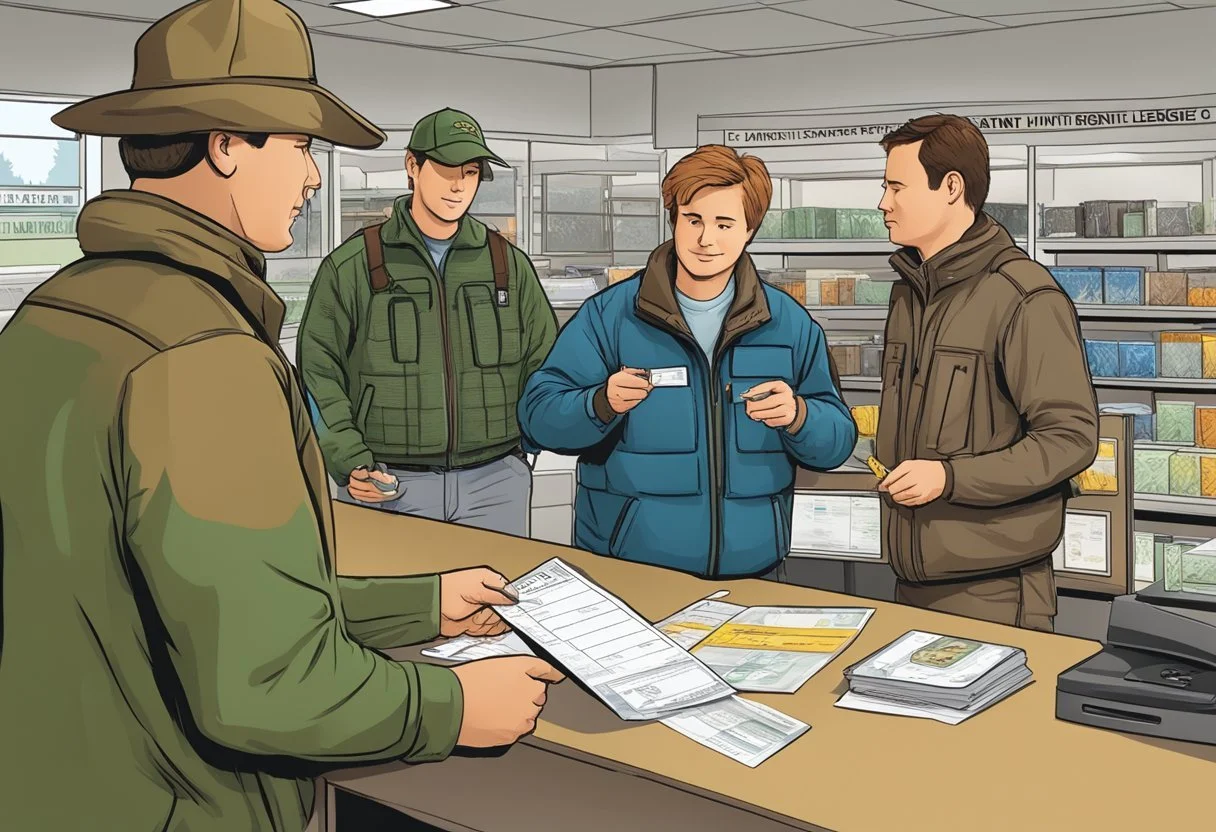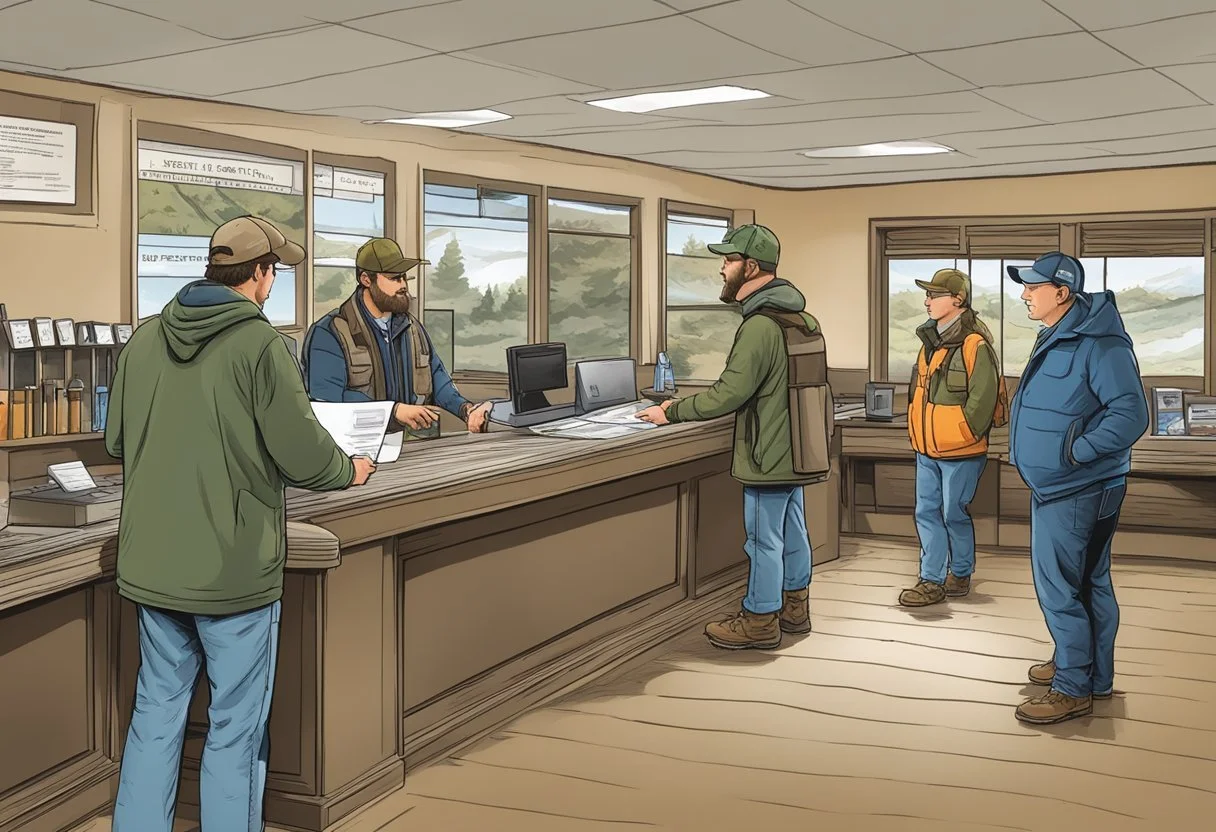How to Get a Indiana Non Resident Hunting License
A 2023 Guide to Regulations and Application
This Article is Part of Our Guide to Non Resident Hunting Licenses by State
Hunting is a regulated activity, and in Indiana, as in other states, it requires adherence to specific licensing rules. Non-resident individuals who wish to engage in hunting, fishing, or trapping within the state of Indiana are required to obtain the appropriate licenses. The Indiana Department of Natural Resources (DNR) manages the issuance of these licenses, ensuring that all participants follow state wildlife conservation laws and regulations.
For non-residents, several types of licenses are available depending on the type of game and the duration of the hunting activity. These licenses can be obtained online, in person at specific retail locations, or by mail. Non-residents must also be aware of the necessity to obtain additional permits or stamps, such as the Harvest Information Program (HIP) number for migratory game birds, and potentially others if they wish to hunt deer or turkey, or to trap furbearers.
Eligibility and Requirements for Non-Residents
For non-residents wishing to hunt in Indiana, understanding and meeting the state's specific requirements is crucial. This section outlines the essential eligibility criteria, education mandates, and other special provisions relevant to non-residents seeking to engage in hunting activities within Indiana.
Basic Eligibility for Non-Residents
Non-Residents must not claim residency for hunting, fishing, or trapping in any other state or country to obtain a hunting license in Indiana. They should establish that their primary residence is outside of Indiana. A person is considered a non-resident if they have not established a fixed and permanent home in Indiana for 60 consecutive days before the purchase of the license.
Mandatory Hunter Education
Any non-resident born after December 31, 1986, must have successfully completed a Hunter Education course before they can purchase a hunting license. Certificates from other states are accepted, but the individual may be asked to present it to a conservation officer upon request.
Special Requirements for Deer Hunting
Non-resident deer hunting requires specific licenses, and options include a youth license or a bundle for antlered deer and additional deer tags. Deer hunting licenses and seasons vary, extending to firearms season, reduction zone hunts, and youth deer season. Non-residents must adhere to Indiana's hunting regulations, which dictate the legal use of shotguns, handguns, rifles, muzzleloading long guns, and air guns for deer hunting.
Required Documentation
Non-residents need to provide a social security number and other personal information to purchase a hunting license. All data is kept secured to protect the owner and used only for conservation and law enforcement purposes. To register for a license, this information must be accurate and verifiable. Non-residents are urged to ensure their documentation is in order before applying for a license to avoid any issues with verification by state authorities.
How to Purchase a License
Purchasing a non-resident hunting license in Indiana is a straightforward process facilitated by the Indiana Department of Natural Resources. Non-residents can conveniently acquire licenses online or in person, and for beginners, there’s an apprentice option available.
Online License Purchases
Non-residents can purchase hunting licenses through the Indiana Fish & Wildlife Online License System. To complete the transaction, it is essential to have access to a printer to print the license immediately after purchase. Payment can be made using a credit card. It is recommended to have personal identification information handy, which includes an out-of-state driver's license number or social security number for verification purposes.
In-Person License Sales
For those preferring direct interaction or lacking internet access, licenses can be purchased in-person at various locations throughout Indiana. The Indiana Department of Natural Resources has licensed retailers, including sporting goods stores and DNR offices in Indianapolis and other areas. Before heading to a retail location, one should confirm its status as an active license vendor.
Apprentice Hunting License Option
The Apprentice Hunting License allows non-residents to hunt in Indiana without having previously completed a hunter education course. This is ideal for novices who are hunting under the direct supervision of a licensed hunter. Fees for licenses vary, and purchasing an apprentice license could be a cost-effective way to experience hunting in Indiana while adhering to conservation regulations. Apprentice licenses can be bought following the same procedures as standard hunting licenses.
When purchasing any type of license, it is advised to reach out to customer service for assistance or consult with a conservation officer for guidance on licensing and local hunting regulations.
Licenses and Fees
The cost and variety of hunting licenses available to non-residents in Indiana reflect the state's efforts to provide tailored options for various hunting activities, while also managing wildlife resources responsibly.
Hunting License Options and Costs
Non-residents can purchase several types of hunting licenses, which vary in cost. An Annual Non-Resident Hunting License is necessary for those seeking to hunt any species of wild animal. There’s also the option for a 5-Day Non-Resident Hunting License for those planning shorter hunting trips. Prices for these licenses are subject to change and should be confirmed with the Indiana Department of Natural Resources (DNR) for the current year.
Annual Non-Resident Hunting License
5-Day Non-Resident Hunting License
Additionally, Youth Hunting Licenses are available at a reduced fee for non-residents under the age of 18. For those interested in trapping, a separate Non-Resident Trapping License is required.
Fishing and Commercial Licenses
In Indiana, non-residents can obtain licenses for fishing or engage in commercial fishing activities. Non-resident Annual Fishing Licenses and One-Day Fishing Licenses are available, which are mandatory for those wishing to fish in Indiana waters. The state also offers licenses for commercial operations, which are distinct from recreational fishing licenses. Costs for these licenses are periodically updated and can be verified through the Indiana DNR.
Non-Resident Annual Fishing License
Non-Resident One-Day Fishing License
Non-Resident Commercial Fishing License
Stamps and Additional Permits
Stamps and permits are additional requirements that non-residents may need to acquire for specific hunting activities in Indiana. A Federal Duck (What wine goes well with duck?) Stamp is required for hunting migratory waterfowl. Non-residents may also need to purchase a Wild Turkey Stamp or a Deer Stamp if pursuing these species. Further, certain hunting activities may involve Bonus Antlerless Quotas, which allow the harvest of additional deer beyond regular bag limits. Transportation tags and DAV (Disabled American Veterans) licenses are available for qualifications that meet specific criteria. It's essential for non-residents to verify requirements and fees for stamps and permits with the Indiana DNR.
Federal Duck Stamp
Wild Turkey Stamp
Deer Stamp
Bonus Antlerless Quotas
Transportation Tags
DAV Licenses
Regulations and Legal Considerations
It's important for non-resident hunters in Indiana to be aware of the specific state and federal regulations that govern hunting, fishing, and trapping. Compliance with these regulations ensures legal engagement in these activities and contributes to the conservation efforts within the state.
State Hunting and Fishing Regulations
In Indiana, non-residents must obtain an appropriate license from the Department of Natural Resources (DNR) for hunting or fishing. A comprehensive list of licenses, such as those for deer, turkey, or smaller species, is available, each with individual bag limits. Regulations are revised periodically, and hunters should check for updates before their trip. During seasons of epizootic hemorrhagic disease (EHD) outbreaks, as seen in counties like Fayette and Franklin, specific emergency measures may be enacted.
Federal Requirements and Stamps
Hunters targeting migratory birds are required to purchase federal duck stamps, in addition to state licenses. Additionally, obtaining a Harvest Information Program (HIP) number is mandatory for tracking the harvest of migratory birds. Non-compliance with these federal requirements could result in legal actions by law enforcement officers.
Trespassing and Hunting on Private Property
To hunt on private land in Indiana, non-residents must secure explicit permission from the landowner. They must also comply with any additional stipulations the landowner may impose. Hunting without permission can lead to fish and wildlife law violations and potential penalties.
Transportation and Reporting of Harvest
After harvesting game, non-residents are obliged to properly use a transportation tag on the species as designated by state regulations. Hunters must report their harvest to the Indiana DNR, particularly for regulated species. Failure to report is a violation of Indiana fish and wildlife laws and can have legal repercussions.
By staying informed about these regulations and legal considerations, non-residents can partake in hunting activities responsibly and lawfully while helping to sustain Indiana’s natural resources.
Additional Information
The "Additional Information" section provides resources for non-resident hunters in Indiana to get support, access hunting guides and resources, and understand the conservation efforts undertaken by the state. For those seeking in-depth knowledge or assistance, these subsections are beneficial.
Contact and Support
Non-resident hunters can obtain assistance regarding hunting licenses through the Indiana Department of Natural Resources (DNR). For specific inquiries, the Indiana Deer Hotline is available at 812-334-3795, Monday through Friday, from 8:30 a.m. to 4 p.m. ET. Additionally, email support is accessible for convenience at [email protected] Customer service centers are stationed strategically, including one in downtown Indianapolis.
Hunting Guides and Resources
The DNR offers comprehensive hunting guides, which include vital information for the 2023-2024 deer hunting seasons. These guides detail key regulations, bag limits, and equipment guidelines. Resources also cover the variety of species available for hunting on both public and private farmland across Indiana. Hunters can find these guides online or at various state properties.
Conservation Efforts by the State
Indiana's conservation officers play a pivotal role in the enforcement of hunting regulations to sustain wildlife populations effectively. The DNR is proactive in conservation efforts, ensuring ethical hunting practices and the conservation of natural habitats. By maintaining ecological balance, these measures preserve Indiana's rich biodiversity, benefiting both the hunters and the state’s natural heritage.
Conclusion
Indiana offers a variety of licensing options for non-resident outdoor enthusiasts. These include licenses for hunting, fishing, and trapping. To engage in hunting activities in Indiana, non-residents must purchase the appropriate hunting licenses, which come at various costs depending on the duration and type of license sought.
Fees for Non-Resident Licenses:
Annual Hunting License: $90
5-day Hunting License: $50
Youth Annual Hunting License: $20
Deer License Bundle: $550
Non-residents can also take advantage of the online license portal for convenient purchase and access to mandatory services, such as the CheckIN Game system and the Harvest Information Program (HIP) number registration.
It is important for non-residents to stay informed of any fee changes that may take effect, as these can influence the cost of planning a hunting trip. As of the provided information, an increment in personal hunting and trapping license fees is expected.
For deer hunting, specific tags must be obtained, and prices for these can vary. It's advisable for non-residents to research and understand the bag limits, season dates, and equipment regulations to ensure compliance with Indiana's conservation laws.
To conclude, non-residents should prepare by reviewing Indiana's hunting regulations and obtaining the necessary licenses before participating in hunting, fishing, or trapping activities within the state. Proper preparation helps ensure a legal and enjoyable outdoor experience.
#IndianaHuntingLicense #NonResidentHunting #OutofStateHunting #HuntingPermits #WildlifeConservation #OutdoorAdventures #HuntingRegulations



